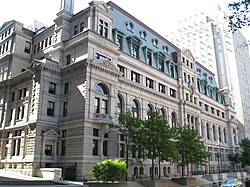Government of Massachusetts | |
|---|---|
 | |
| Polity type | Presidential republic Federated state |
| Constitution | Constitution of Massachusetts |
| Legislative branch | |
| Name | General Court |
| Type | Bicameral |
| Meeting place | Massachusetts State House |
| Upper house | |
| Name | Senate |
| Presiding officer | Karen Spilka, President |
| Lower house | |
| Name | House of Representatives |
| Presiding officer | Ronald Mariano, Speaker |
| Executive branch | |
| Head of state and government | |
| Title | Governor |
| Currently | Maura Healey |
| Appointer | Election |
| Cabinet | |
| Name | 9 Executive Agencies |
| Leader | Governor |
| Deputy leader | Lieutenant Governor |
| Headquarters | State House |
| Judicial branch | |
| Name | Judiciary of Massachusetts |
| Courts | Courts of Massachusetts |
| Massachusetts Supreme Judicial Court | |
| Chief judge | Kimberly S. Budd |
| Seat | Suffolk County Courthouse, Boston |
The Commonwealth of Massachusetts is governed by a set of political tenets laid down in its state constitution. Legislative power is held by the bicameral General Court, which is composed of the Senate and House of Representatives. The governor exercises executive power with other independently elected officers: the Attorney General, Secretary of the Commonwealth, and Auditor. The state's judicial power rests in the Supreme Judicial Court, which manages its court system. Cities and towns act through local governmental bodies to the extent that they are authorized by the Commonwealth on local issues, including limited home-rule authority. Although most county governments were abolished during the 1990s and 2000s, a handful remain.
Contents
- Federal government
- Congressional delegation
- Federal courts
- Electoral College
- Executive
- Constitutional officers
- Cabinet and government agencies
- Legislature
- Judiciary
- Supreme Judicial Court
- Appeals Court
- Trial courts
- County government
- Sheriffs
- District attorney
- Registry of deeds
- Municipal government
- Elections and politics
- Ratings and rankings
- Transparency
- See also
- References
- Further reading
- External links
Massachusetts' capital city is Boston. The seat of power is in Beacon Hill, home of the legislative and executive branches. The Supreme Judicial Court is in nearby Pemberton Hill.


















